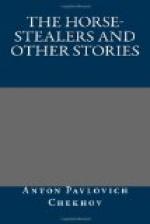The monks worked and prayed, and their Father Superior played on the organ, made Latin verses, and wrote music. The wonderful old man possessed an extraordinary gift. He played on the organ with such art that even the oldest monks, whose hearing had grown somewhat dull towards the end of their lives, could not restrain their tears when the sounds of the organ floated from his cell. When he spoke of anything, even of the most ordinary things—for instance of the trees, of the wild beasts, or of the sea—they could not listen to him without a smile or tears, and it seemed that the same chords vibrated in his soul as in the organ. If he were moved to anger or abandoned himself to intense joy, or began speaking of something terrible or grand, then a passionate inspiration took possession of him, tears came into his flashing eyes, his face flushed, and his voice thundered, and as the monks listened to him they felt that their souls were spell-bound by his inspiration; at such marvellous, splendid moments his power over them was boundless, and if he had bidden his elders fling themselves into the sea, they would all, every one of them, have hastened to carry out his wishes.
His music, his voice, his poetry in which he glorified God, the heavens and the earth, were a continual source of joy to the monks. It sometimes happened that through the monotony of their lives they grew weary of the trees, the flowers, the spring, the autumn, their ears were tired of the sound of the sea, and the song of the birds seemed tedious to them, but the talents of their Father Superior were as necessary to them as their daily bread.
Dozens of years passed by, and every day was like every other day, every night was like every other night. Except the birds and the wild beasts, not one soul appeared near the monastery. The nearest human habitation was far away, and to reach it from the monastery, or to reach the monastery from it, meant a journey of over seventy miles across the desert. Only men who despised life, who had renounced it, and who came to the monastery as to the grave, ventured to cross the desert.
What was the amazement of the monks, therefore, when one night there knocked at their gate a man who turned out to be from the town, and the most ordinary sinner who loved life. Before saying his prayers and asking for the Father Superior’s blessing, this man asked for wine and food. To the question how he had come from the town into the desert, he answered by a long story of hunting; he had gone out hunting, had drunk too much, and lost his way. To the suggestion that he should enter the monastery and save his soul, he replied with a smile: “I am not a fit companion for you!”
When he had eaten and drunk he looked at the monks who were serving him, shook his head reproachfully, and said:




